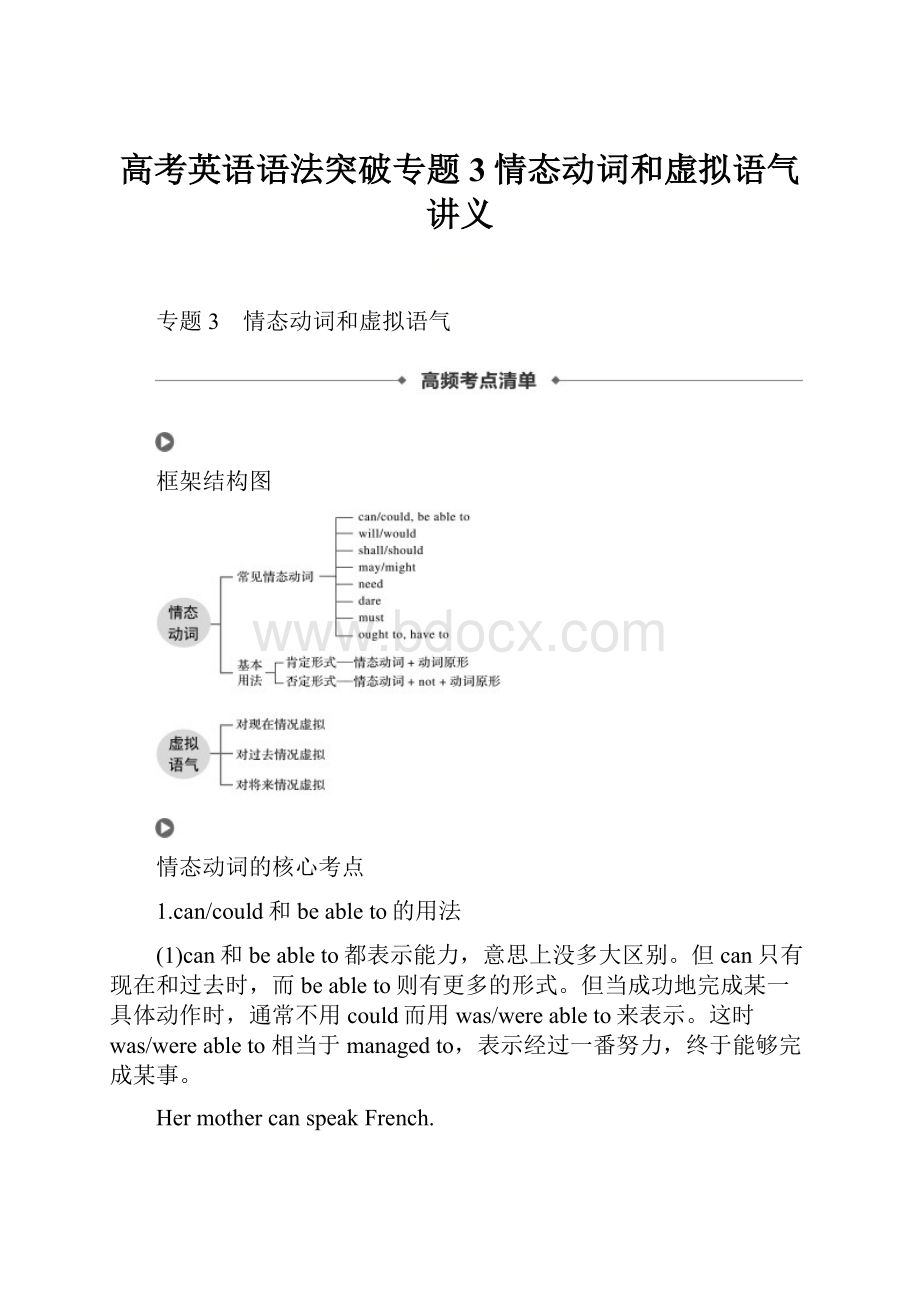高考英语语法突破专题3情态动词和虚拟语气讲义.docx
《高考英语语法突破专题3情态动词和虚拟语气讲义.docx》由会员分享,可在线阅读,更多相关《高考英语语法突破专题3情态动词和虚拟语气讲义.docx(27页珍藏版)》请在冰豆网上搜索。

高考英语语法突破专题3情态动词和虚拟语气讲义
专题3 情态动词和虚拟语气
框架结构图
情态动词的核心考点
1.can/could和beableto的用法
(1)can和beableto都表示能力,意思上没多大区别。
但can只有现在和过去时,而beableto则有更多的形式。
但当成功地完成某一具体动作时,通常不用could而用was/wereableto来表示。
这时was/wereableto相当于managedto,表示经过一番努力,终于能够完成某事。
HermothercanspeakFrench.
Thewoundedmanwasstillabletogettothevillageandwassavedbythevillagersintheend.
(2)can/could表示猜测“可能”,一般用于疑问句和否定句。
—Canthenewsbetrue?
—Itcan’tbetrue.
Someoneisknockingatthedoor.Whocoulditbe?
(3)can可以表示理论上的可能性,指常有的行为或情形,意为“有时会……”。
Anybodycanmakemistakes.
(4)表示请求、允许(表请求时,口语中常用could代替can使语气更委婉,回答时用can)。
CanIgonow?
—CouldIcometoseeyoutomorrow?
—Yes,youcan.(否定答语可用No,I’mafraidnot.)
(5)表示惊异、怀疑、不相信的态度(主要用于否定句、疑问句或感叹句中)。
Howcanthatbetrue?
Ican’tbelievemyeyesandears.
Howcouldyoubesocareless?
(6)can的特殊用法。
canbut只好;can’tbut不得不;can’t...too再……也不为过,越……越好
Icanbutwait.
Ican’tbutwait.
Youcan’tbetoopatienttothecustomers.
2.may和might的用法
(1)表示允许、请求,might比may的语气更委婉一些。
—MayIwatchTVnow?
—Yes,youmay.(Yes,please.)
—No,youmustn’t.(No,you’dbetternot.)
(2)表示可能性时,might比may的可能性小,may表示的可能性比can小(主要用于陈述句、肯定或否定句,疑问句用can代替)。
Thestorymaynotbetrue.
(3)表示祝愿(不用might)
Mayyousucceed!
(4)may/mightaswell最好还是……,不妨
Youmightaswelldoitnow.
(5)may/mightwell很可能
Hemaywellbelateforclass.
3.must,haveto和oughtto的用法
(1)must
①表示“必须,应该,一定要”。
强调主观看法,只有现在时形式,否定式是mustnot(mustn’t)。
must开头的问句,其否定回答要用needn’t或don’thaveto来表达。
Wemustdoitnow.
—MustIhandinthepapertoday?
—Yes,youneed/must.
—No,youneedn’t/don’thaveto.
②表示必然的结果。
Allmenmustdie.
③还可表示主语固执、偏要做他人不希望做的事。
Itcan’thelp;hemustdothat.
(2)haveto着重客观需要,能用于更多时态(过去时或将来时)。
Hewillhavetobetherebeforeten.
(3)oughtto表示义务和责任,意为“应该”,比should语气要强。
Yououghttotakecareofyourself.
4.need和dare的用法
(1)need表示“需要,必要”,只能用于否定句和疑问句。
在肯定句中,常用must和haveto代替。
Youdon’tneedtodoitatonce.
NeedIcome?
(2)dare表示“敢”,通常用于否定句、疑问句和条件状语从句中。
Idaren’taskherforarise.
Dareyougohomealoneatelevenintheevening?
Ifyoudarespeaktomelikethatagain,you’llbesorry.
(3)need和dare的特殊用法
①need表“需要”时,可用want,require代替。
Thedeskneedsrepairing/toberepaired.
=Thedeskwants/requiresrepairing/toberepaired.
②dare作实义动词时,在肯定句中要接to,在疑问句和否定句中to可省去。
Hedarestocatchasnake.
Idonotdare(to)complain.
Doyoudare(to)swimintheriver?
5.will和would的用法
(1)will
①表示请求、建议,常用于第二人称。
Willyoupleasegowithme?
②表示意愿、决定、允许。
Iwillneverdothatagain.
③表示习惯性动作或某种倾向,意为“总是,惯于”,通常用于第三人称。
Rosawillalwaysbelateforschool.
(2)would
①表示请求、建议,比will委婉,指现在时间,多用于第二人称。
Wouldyoulikeacupoftea?
②表示过去习惯性动作或某种倾向。
WewouldplaybadmintononSundays.
6.shall和should的用法
(1)shall
用于第一、三人称,在问句中表示征求对方意见或请求。
ShallIcomein?
Whenshallhebeabletoleavethehospital?
用于第二、三人称的陈述句中,表示命令、允诺或威胁。
Youshalldoasyourfathersays.
HeshallhavethebookwhenIfinishreading.
Heshallbepunished.
(2)should
①表示责任、义务,意为“应该”。
Youshouldlistentoyourdoctor’sadvice.
②表示惊讶语气,意为“竟然”。
Youshouldwearslippersinclass.
③用于条件句,表示“假如,万一”;省去if,should可提至句首。
Shouldyoubelate,apologizetotheteacher.
7.情态动词表示推测或判断的用法
情态动词
对现在和未来的推测
对过去的推测
使用场合
must
must+do
musthavedone
肯定句
may/might
may/might+do
may/mighthavedone
肯定句、否定句
can/could
can/coulddo
can/couldhavedone
否定句、疑问句(could可用于肯定句)
should
shoulddo
shouldhavedone
肯定句、否定句、疑问句
情态动词+havedone的用法:
(1)shouldhavedone表示“本来应该做某事而实际上未做”,而shouldn’thavedone则表示“本不应该做某事而实际上做了”。
Youshouldhavetoldmeaboutitearlier.
Youshouldn’thavesaidsuchwordstoyourparents.
(2)oughttohavedone表示“本应该做某事而实际上未做”,而oughtnottohavedone则意为“本不应该做某事而实际上做了”。
Yououghttohavetoldmeaboutitearlier.
Yououghtnottohavesaidsuchwordstoyourparents.
(3)needn’thavedone表示“本无必要做某事而实际上做了”。
Youneedn’thavewalkedsoquicklysincetimewasenough.
(4)couldhavedone表示“本来有可能做某事而事实上未做到”。
Icouldhavecomeontime,butmycarbrokedownontheway.
(5)may/mighthavedone表示“过去可能发生过某事”或“本来应该/可以做某事(实际上没做)”。
Youmighthavegivenhimmorehelp,butyouweresobusy.
虚拟语气的核心考点
1.虚拟语气用于条件状语从句
(1)表示与现在事实相反的假设,条件状语从句中的谓语动词用一般过去时(be动词用were),而主句中的谓语动词用“would/should/could/might+动词原形”。
IfIwereyou,Iwouldbuythathouse.
Ifhehadtime,heshouldgowithyou.
(2)表示与过去事实相反的假设,条件状语从句中的谓语动词用过去完成时,主句中的谓语动词则用“would/should/might/could+have+过去分词”。
Ifhehadtakenmyadvice,hewouldhavesucceededinpassingtheexamination.
(3)表示与将来事实相反的假设,条件状语从句中的谓语动词用一般过去时或“should/wereto+动词原形”,而主句中的谓语动词则用“would/should/could/might+动词原形”。
Ifitrained/shouldrain/weretoraintomorrow,thefootballmatchwouldbeputoff.
(4)当条件状语从句表示的行为和主句表示的行为所发生的时间不一致时,动词的形式要根据它所表示的时间作相应调整。
Iftheyhadworkedhard,theywouldbeverytirednow.(从句说的是过去,主句指的是现在)
2.虚拟语气用于名词性从句
(1)虚拟语气在宾语从句中的运用。
①“wish+宾语从句”表示不能实现的愿望,译为“要是……就好了”。
表示现在没有实现的愿望,从句中的谓语动词用一般过去时(be动词用were);表示将来不能实现的愿望,从句中的谓语动词用“would/could+动词原形”;表示过去未能实现的愿望,从句中的谓语动词用“had+过去分词”。
Iwishitwerespringalltheyearround.
IwishIhadknowntheanswer.
IwishIcouldflylikeabird.
②在表示“建议、要求、命令”等动词后的宾语从句中,谓语动词用“should+动词原形”,should可以省略。
常见的这类动词有:
suggest,advise,propose,demand,require,insist,request,command,order等。
Shesuggestedwe(should)leavehereatonce.
Thedoctororderedshe(should)beoperatedon.
(2)虚拟语气在同位语从句和表语从句中的运用。
表示“建议、要求、命令”等的名词,如advice,idea,order,demand,plan,proposal,suggestion,request等,其后的表语从句和同位语从句中谓语动词用“should+动词原形”,should可以省略。
Hissuggestionthatwe(should)gotoShanghaiiswonderful.
Myideaisthatthey(should)pay100dollars.
(3)虚拟语气在主语从句中的运用。
在主语从句中,谓语动词的虚拟语气用“(should+)动词原形”的结构,表示惊奇、不相信或理应如此等。
Itisnecessarythatwe(should)cleantheroomeveryday.
Itwasapity/ashamethatyou(should)besocareless.
Itwillbedesiredthatshe(should)finishherhomeworkthisafternoon.
注意:
这种从句表示的是事实。
如果人对这种事实表现出惊奇的情感,就可用虚拟语气;反之,如果不表示惊奇等情感,that从句也可用陈述语气。
Itisapitythatyoucan’tswim.
3.虚拟语气在其他场合的运用
(1)虚拟语气在asif/though,evenif/though等引导的表语从句或状语从句中,如果从句表示的动作发生在过去,用过去完成时;指现在状况,则用一般过去时(be动词用were);指将来状况,则用would/could/might+动词原形。
Hespokeasifhehadknownit.
Youlookasifyoudidn’tcare.
Evenifshewerehere,shecouldnotsolvetheproblem.
(2)虚拟语气用于句型“Itis(high)time(that)...”中,从句的谓语动词用一般过去时(be用were)或“should+动词原形”,should不可省略,意为“(现在)该……”。
It’stimethatIpickedup/shouldpickupmydaughter.
(3)虚拟语气用在ifonly引导的感叹句中,对现在的虚拟用一般过去时(be用were);对过去的虚拟用过去完成时。
IfonlyIwereapilot.
IfonlyIhadtakenhisadvice.
(4)虚拟语气在一些简单句中的运用。
①情态动词的过去式用于现在时态时,表示说话人谦虚、客气、有礼貌或语气委婉,常出现在日常会话中。
Itwouldbebetterforyounottostayuptoolate.
Wouldyoubekindenoughtoclosethedoor?
②用于一些习惯表达法中。
Wouldyoulikesomethingtodrink?
Iwouldrathernottellyou.
(5)wouldrather虚拟语气的用法。
wouldrathersb.didsth.是对现在的虚拟;
wouldrathersb.haddonesth.是对过去的虚拟。
1.表达的单调性
例如在写一封回信向好友表达建议时,重复使用Youshould...既显得单调,同时强硬的语气影响了交际效果。
我们可以灵活多样地表达建议,如You’dbetter.../Youmightaswell.../Whynot...?
等。
2.情态动词搭配错误
Ⅰ.单句语法填空
Ican’tfindmypurse.Icould/might have left(leave)itinthesupermarketyesterday,butI’mnotsure.(2018·天津)
解析 句意为:
我找不到我的钱包了,昨天我有可能把它落到超市里了,但我不确定。
根据句中时间状语yesterday可知,是对过去发生事情的推测,故用“情态动词+havedone”,再根据后句butI’mnotsure可知,此推测为不能肯定的推测,故用could/mighthavedone。
Ⅱ.单句改错(每小题仅有1处错误)
1.Asakid,Ilovedtowatchcartoons,butnomatterhowmanytimesIaskedtowatchthem,myparentswouldnottoletme.(2018·全国Ⅱ)
解析 would(not)表示“意愿”时后面直接跟动词原形,故把to删除。
2.Thenheandmymotherwouldhavehadadrinkwhilesheprepareddinnerandtheywouldtalkabouthisdayandhers.(2016·浙江)
解析 根据语境可知,此处是描述的过去的一种习惯,故用woulddo表示“过去常常做”。
wouldhavedone表示对过去事情的假设,意为“本来会做”。
3.Someclassmatessuggestwecan或
gotoplacesofinterestnearby.(2016·全国Ⅱ)
解析 suggest表示“建议”时,后面的宾语从句的谓语动词要用shoulddo形式,should可以省略,故答案有两种改法。
4.Wemust
waystoprotectourenvironment.(2015·全国Ⅰ)
解析 情态动词后面要接动词原形。
题组一 情态动词集训
Ⅰ.单句语法填空
1.Idon’tknowwheresheis;shemaybeinWuhan.
2.Theroadiswet.Itmusthaverainedlastnight.
3.Youshallbepunishedifyoucheatintheexam.
4.Don’tworry.I’vejustsentanambulancetoyou.Theyshouldbethereanysecond.
5.Ishouldhavegonetotheschoollibrary,butitrainedheavily,soIdidnot.
Ⅱ.单句改错(每小题仅有1处错误)
1.Youhadbetternottohavestayedthere,butyoudid.
2.Mypunishmentlastedayear.Meanwhile,IfoundoutthatwithmorepatienceI
makemytoyslast.Myattitudechangedfromthenon.
3.Ihavebeenpractisingforthreeweeksnow,butIstill
getusedtoit—infact,I’venearlykilledthreepeople.
4.Thankyouforallyouhavedoneforme.Mom,thoughImay
oftensayit,Idoloveyou.
5.Judgingfromwhatyousaid,heought
succeed.
题组二 虚拟语气集训
Ⅰ.单句语法填空
1.Hewalkedinasifhehad bought(buy)theschool.AndthewordquicklygotaroundthathewasfromNewYorkCity.
2.Ifyouhad told(tell)methenewsyesterday,Iwouldn’tbesoworriednow.
3.Sorry,Iamtoobusynow.IfIhad(have)time,Iwouldcertainlygoforanoutingwithyou.
4.Hewasverybusyyesterday;otherwisehewould have come(come)totheparty.
5.It’stimethatourgovernmenttook/should take(take)measurestoimprovethequalityofthebuildings.
6.MrLiinsistedthatthesportsmeeting(should) be put(put)offbecauseofthebadweather.
Ⅱ.单句改错(每小题仅有1处错误)
1.IfI
10yearsyounger,Iwouldstartalloveragain.
2.Ifwehad
enoughrainlastyear,wecouldhavegainedagoodharvest.
3.
Itobeateacherinthefuture,firstofall,Iwouldtrymybesttogivestudentslessons.
4.Georgeisgoingtotalkaboutthegeographyofhiscountry,butI’dratherhe
moreonitsculture.
5.Thechairmandemandedthatpeoplepresent
everyefforttoprotectthepolarbearagainstdyingout.
Ⅲ.语法填空(情态动词和虚拟语气专练)
Lucyisanoutgoinglady.She1.canplaymanykindsofmusicalinstruments.Actually,she2.couldplaythepianowhenshewas8yearsold.Lucyalsokeepstakingexerciseeveryday.Shesaysthatsheha